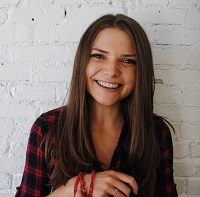I was clipped in on my bike at my local spin studio at 6:55 a.m. on Tuesday morning last week, waiting for the teacher to arrive, when I overheard a conversation between three women that I couldn’t ignore.
“I just can’t stand it when women allow their nails get all ratched.”
“Yea, we’re not in middle school anymore; grown women need to make sure their nails look nice!”
“This is a good reminder. Thank you both for holding me accountable; I’ve been lazy about getting manicures.”
At first, after I made sure my un-manicured nails were hidden under my handlebars, I felt annoyed at these women for how downright judgey they were being. But then, I recalled a moment not too long ago when I told one of my sisters that their eyebrows were “getting out of control” and cajoled her to make an appointment to get them threaded.
I began reflecting on how often we women (myself included) take it upon ourselves to become the “Beauty Police” for other women.
(Note: women commonly police each other in myriad ways, including policing each other’s bodies and sexuality and policing each other to be submissive and conform to gender roles, but in this article, I’m focusing specifically on women policing each other’s appearance).
Our bodies and sexuality are constantly being policed in subtle and overt ways by entities such as the government, religion, and the media. Every time we watch a mainstream movie or scroll through social media, we are covertly being asked to conform to ideals that don’t benefit us. So why, on top of all of this, do we police each other’s appearance?
Why do we feel the need to speak up when another woman, especially a friend, isn’t conforming to today’s long list of arbitrary aesthetic directives? Do we really think we’re doing her a favor?
As I furiously pedaled my spin bike, I scanned through Naomi Wolf’s book The Beauty Myth in my mind for an answer, and I recalled this quote:
“‘Beauty’ is a currency system like the gold standard. Like any economy, it is determined by politics, and in the modern age in the West it is the last, best belief system that keeps male dominance intact. In assigning value to women in a vertical hierarchy according to a culturally imposed physical standard, it is an expression of power relations in which women must unnaturally compete for resources that men have appropriated for themselves.”
The bold conclusion that I drew was this: female-to-female “beauty policing” is actually a microaggression that we enact on one another because of our internalized oppression.
Let’s unpack that whopper of a sentence.
First, what do I mean by “internalized oppression”?
An article by Science Direct explains that:
“members of historically marginalized groups are presented with multiple disparaging messages about their identity groups through both interpersonal interactions (e.g., from peers, family members, educators, police officers) and systemic oppression (e.g., discriminatory laws and policies, harmful media representations). As such, they may develop harmful thoughts and feelings about their own social identity groups and participate in an array of self-destructive or self-hating behaviors towards themselves or others in their group (David, 2014; David & Derthick, 2017). For example, because of socialized gender role norms and mainstream standards of beauty, many women may internalize misogyny.”
So how is women policing others’ appearance indicative of internalized oppression? Three studies conducted in a British community with a total of 1,158 participants completed a series of scales that “examined the associations among sexist beliefs, objectification of others, media exposure, and three distinct beauty ideals or practices.” The results of this study “supported the idea that sexist beliefs predicted beauty ideals and practices,” and showed that the more someone internalized sexist ideals, the more obligation they felt to participate in beauty practices.
Naomi Wolf, once again, says it best: “A culture fixation on female thinness is not an obsession about female beauty but an obsession about female obedience.”
Next, what do I mean by “beauty policing”?
Let’s start by referring to UBC wiki’s definition: “Under the patriarchy and misogynistic history of the world, women, their bodies and their lives have been policed and warped to suit the desires of others. According to the Oxford English Dictionary, policing is defined as ‘the activity of controlling an industry, an activity, etc., to make sure that people obey the rules.’ In a beauty context, these restrictions force them to conform to standards that benefit the patriarchy.”
Those who enforce harmful dominant narratives (like the narrative that women need to put much extra time, energy and resources into their appearance to appease the male gaze), are, according to Mark Tappan, typically those who have ‘‘adopted the [dominant] group’s ideology and accept their subordinate status as deserved, natural, and inevitable.’
In other words, we have internalized the notion that we as women are less inherently valuable than men, and we require each other to sacrifice our time, energy, and money to perform elaborate beauty rituals as an act of subservience and in order to gain their approval.
In Naomi Wolf’s words: “We are in the midst of a violent backlash against feminism that uses images of female beauty as a political weapon against women’s advancement.”
And finally, what do I mean by a microaggression?
Kevin Nadal defines a microaggression as the everyday, subtle, intentional—and oftentimes unintentional—interactions or behaviors that communicate some sort of bias toward historically marginalized groups.
The difference between microaggressions and overt discrimination or macroaggressions is that people who commit microaggressions might not even be aware of them.
So why could the act of reminding a woman that she will be judged if she doesn’t get her nails done be considered a microaggression? Because even though the intent behind that reminder might be good, the impact on that woman is not. It reinforces the harmful notion that she must spend her money and time on beauty rituals in order to be accepted and to belong.
She will then likely choose to take time away from other activities that could benefit her mental, physical, social, emotional, and/or financial health and stability in order to check the boxes of these supposed mandatory beauty rituals.
Groupon found that women who routinely spend money on their appearance spend an average of $313 a month, and this doesn’t even account for the money those women could have made if they spent that time earning.
This got me thinking about all of the beauty rituals that I have been socialized to believe I should engage in on a regular basis in order to avoid judgment (mostly by that of other women.) So I listed them out, and then for each one, I asked Google “how often should women ______” and “how long does it take a woman to ______ on average.”
Here’s what I found:
>> Manicure, every 2 weeks, takes 45 min each
>> Pedicure once a month month, 45 mins
>> Hair cut–every three months 45 mins
>> Highlights–1.5 months–2 hours
>> Eyebrow wax–monthly–25 mins
>> Brazilian wax–monthly–25 mins
>> Shaving legs–2x/week, 5 minutes each time = 40 mins/week
>> Makeup= 20 mins/day = 560 mins/month (9.3 hours/month)
>> Blow dry/straightening hair= 1 hour 15 mins/week = 5 hours/month
If a woman were to do all of these beauty rituals that she is “supposed” to do (according to Google), it would amount to 955 minutes (about 16 hours) per month to just do the beauty procedures, plus a minimum of 75 mins total driving time to appointments, for a total of 17 hours 15 mins. If we factor in the opportunity cost, for someone who makes $20/hour, that’s almost $345/month that they could have made if they were working during that time.
Now, obviously it is highly unlikely that someone making $20/hour would be able to afford this upkeep. But that’s part of the point—these standards are completely unrealistic, leaving it so only the most privileged are able to meet them, increasing the class divide and leaving most women feeling like we’re missing the mark.
So let’s break this down a bit further: the average amount women spend on appearance ($313/month) plus the $345/month (the money they could have made if they were working during the 17+ hours/month Google tells us we should be engaging in beauty procedures) equals $658/month or $7,896/year.
Over the course of 60 years, this amounts to $473,760–possibly more than enough to pay for a bachelors, masters, and a PHD. And the time we spend engaging in beauty rituals over the course of a lifetime certainly could have amounted to that needed to complete these degrees.
My calculation was based on someone making $20/hour, but if said person had used that saved time and money to get a PHD, her average hourly income would be $58 (compared to $73 for a man, but that’s an article for another time). This would increase the opportunity cost of beauty rituals to a staggering $709,920 over 60 years.
When women believe we need to police each other’s appearance, we collectively lose. In the long term, we rob ourselves of our time, our money, our education, and the ways in which we could otherwise be meaningfully connecting, un-learning our internalized misogyny, and uniting to rebel against a system that is stacked against us.
So here are a few questions you can ask yourself before you suggest that another woman do something like shave her legs or cover up her greys:
1. Is this something that I know she would want to be told (for example: spinach in her teeth)? In other words, is the suggestion I am making to this woman something that I have reasonable cause to believe is in alignment with her own values (i.e. does she actually have a value for eliminating her gray hairs?), or am I enforcing an aesthetic value on her?
2. Is what I am asking of her something that would take her time, money, or energy away from other things that might be of more benefit to her?
3. Would I make the same suggestion to a man?
When we as women question the harmful directives society has put upon us and stop enforcing unrealistic, energy-zapping norms on each other, we instead begin encouraging each other to discover what else may be possible for ourselves, our female friendships, women, and our world.
~
Please consider Boosting our authors’ articles in their first week to help them win Elephant’s Ecosystem so they can get paid and write more.



Read 15 comments and reply